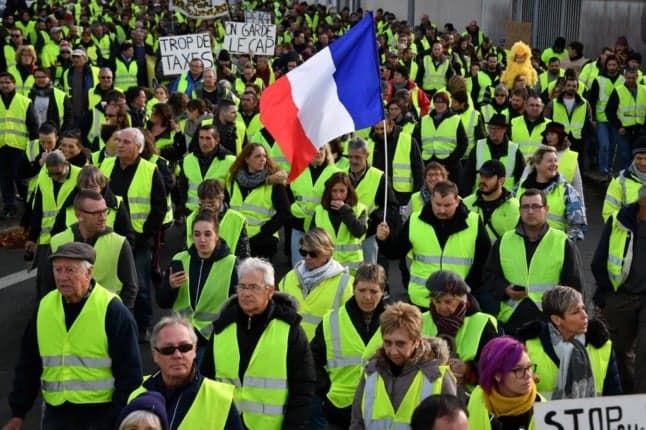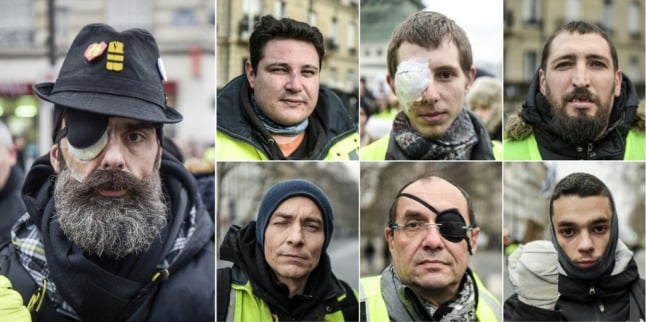Whatever happened to the 'yellow vests' in France?

Wednesday marks three years since the first 'yellow vests' protest in France - which began began as a complaint about fuel prices and grew into a social movement that rocked the country, before quietly withering away.
Here are some of the key numbers that tell the story of the movement.
17
Saturday, November 17th 2018 marked the first 'yellow vest' protest - a day of action sparked by a new fuel tax which protesters said unfairly affected those living in rural areas, who rely on cars because of poor public transport links.
The 'yellow vests' by which the movement would become known were worn as a nod to the original members of movement - drivers. The symbolism comes from the fact that French law obliges all motorists to keep a high-vis yellow vest or jacket in their car, in case of a breakdown.
282,000
The huge estimated turnout of the first Saturday protest came as a surprise to politicians, especially since the yellow vest movement was essentially leaderless and had grown largely through social media platforms, particularly Facebook. Although initially focused on fuel taxes it grew into a general protest against the cost of living, especially in rural or small-town France.
Many people outside the cities felt left-behind and forgotten by Paris-based politicians. The early 'yellow vests' were often working people who simply could not afford the ever-increasing cost of living, although as the protests grew they began to encompass more and more everyday frustrations of French people.
2
Protests continued weekly on Saturdays, still drawing huge crowds, so in January 2019, after two months of protest, president Emmanuel Macron launched the Grand Débat, a national 'listening exercise' that involved thousands of meetings around France, plus an online register where people could list their grievances and demands.
Macron himself took part in several debates, including a meeting with 600 local mayors. The entire exercise lasted for two months.
18th
But still protests continued on Saturdays, with the original 'roundabout' protests in small towns and rural areas slowly giving way to more organised street demos based in cities.
As the geography changed so too did the profile of the protesters, from being largely rural and apoliticial (many 'yellow vests' said they had never before attended a demo) to younger, city-dwellers who had previously been involved with politics and demonstrations and - in the case of the Black Blocs - violence.
It was the 18th week of protests, on March 16th 2019, that really shocked France and the world, as protesters ran amok along the Champs-Elysées, trashing stores in an orgy of arson and vandalism. The violence would ultimately cost the Paris police chief his job, as police were accused of being unprepared and unable to stop the rampage.
After this 'yellow vest' protests increasingly became known for violence, especially at the hands of the professional rioters of the 'Black Bloc' and this contributed further to the fall in turnout, especially from older people and families who had no wish to get caught up in riots.
8
Once the government realised the scale of the protests, the fuel tax that had sparked the whole thing was quietly scrapped.
But by that time the 'yellow vest' demands had grown, encompassing a range of issues from tax cuts to more representative democracy and the immediate resignation of president Emmanuel Macon.
In April 2019, after concluding the Grand Débat, Macron unveiled new proposals. He offered eight main concessions: income tax cuts largely targeted at middle-earners; end of year bonuses for low-paid workers; a boost to pensions for lower earners (although an increased pension age for others); no more school or hospital closures until 2022; more direct democracy such as citizen councils and referendums; a cut in the number of MPs and the abolition of the Ecole Nationale d'Administration (ENA) which was widely seen as a 'breeding ground for the elite'. He did not offer to resign.

Seven of the protesters who lost eyes during the 'yellow vest' protests. Photo: AFP
1,200
Police say that 1,200 officers were injured during the months of 'yellow vest' protests, but the violence was far from one-sided, with at least 1,900 protesters also hurt.
French police came in for heavy criticism of their actions during demos, particularly their use of the highly controversial 'flash grenades' which left dozens of protesters seriously injured - including five people who lost a hand (some after picking up grenades to throw back at police) and 25 who were blinded or lost an eye after being hit with rubber bullets.
One woman also died during protests, an elderly lady in Marseille who was hit by a stray tear gas grenade as she closed the shutters in her apartment.
READ ALSO How the 'yellow vests' forced France to have a national conversation about police violence
28,600
By the time of the first anniversary of the protests on November 17th 2019, turnout had fallen dramatically to 28,600 according to the Interior Ministry (or 40,000 according to the organisers) and protests were largely concentrated in cities. At the anniversary protests 254 people were arrested, 173 of them in Paris.
2
Since 2019 the 'yellow vests' have continued, but in increasingly tiny numbers with protests largely confined to Paris and a couple of other cities.
Some of the high profile early 'leaders' of the leaderless movement have stepped back from protests, while others stood unsuccessfully in local and European elections.
There have also been attempts to link 'yellow vest' protests to other causes, including Extinction Rebellion, the pension reform protests in late 2019 and early 2020 and more recently the anti health pass demonstrations. But 'yellow vest' demonstrations have never managed to turn out in large numbers as they did in the movement's heyday.
Comments (1)
See Also
Here are some of the key numbers that tell the story of the movement.
17
Saturday, November 17th 2018 marked the first 'yellow vest' protest - a day of action sparked by a new fuel tax which protesters said unfairly affected those living in rural areas, who rely on cars because of poor public transport links.
The 'yellow vests' by which the movement would become known were worn as a nod to the original members of movement - drivers. The symbolism comes from the fact that French law obliges all motorists to keep a high-vis yellow vest or jacket in their car, in case of a breakdown.
282,000
The huge estimated turnout of the first Saturday protest came as a surprise to politicians, especially since the yellow vest movement was essentially leaderless and had grown largely through social media platforms, particularly Facebook. Although initially focused on fuel taxes it grew into a general protest against the cost of living, especially in rural or small-town France.
Many people outside the cities felt left-behind and forgotten by Paris-based politicians. The early 'yellow vests' were often working people who simply could not afford the ever-increasing cost of living, although as the protests grew they began to encompass more and more everyday frustrations of French people.
2
Protests continued weekly on Saturdays, still drawing huge crowds, so in January 2019, after two months of protest, president Emmanuel Macron launched the Grand Débat, a national 'listening exercise' that involved thousands of meetings around France, plus an online register where people could list their grievances and demands.
Macron himself took part in several debates, including a meeting with 600 local mayors. The entire exercise lasted for two months.
18th
But still protests continued on Saturdays, with the original 'roundabout' protests in small towns and rural areas slowly giving way to more organised street demos based in cities.
As the geography changed so too did the profile of the protesters, from being largely rural and apoliticial (many 'yellow vests' said they had never before attended a demo) to younger, city-dwellers who had previously been involved with politics and demonstrations and - in the case of the Black Blocs - violence.
It was the 18th week of protests, on March 16th 2019, that really shocked France and the world, as protesters ran amok along the Champs-Elysées, trashing stores in an orgy of arson and vandalism. The violence would ultimately cost the Paris police chief his job, as police were accused of being unprepared and unable to stop the rampage.
After this 'yellow vest' protests increasingly became known for violence, especially at the hands of the professional rioters of the 'Black Bloc' and this contributed further to the fall in turnout, especially from older people and families who had no wish to get caught up in riots.
8
Once the government realised the scale of the protests, the fuel tax that had sparked the whole thing was quietly scrapped.
But by that time the 'yellow vest' demands had grown, encompassing a range of issues from tax cuts to more representative democracy and the immediate resignation of president Emmanuel Macon.
In April 2019, after concluding the Grand Débat, Macron unveiled new proposals. He offered eight main concessions: income tax cuts largely targeted at middle-earners; end of year bonuses for low-paid workers; a boost to pensions for lower earners (although an increased pension age for others); no more school or hospital closures until 2022; more direct democracy such as citizen councils and referendums; a cut in the number of MPs and the abolition of the Ecole Nationale d'Administration (ENA) which was widely seen as a 'breeding ground for the elite'. He did not offer to resign.

1,200
Police say that 1,200 officers were injured during the months of 'yellow vest' protests, but the violence was far from one-sided, with at least 1,900 protesters also hurt.
French police came in for heavy criticism of their actions during demos, particularly their use of the highly controversial 'flash grenades' which left dozens of protesters seriously injured - including five people who lost a hand (some after picking up grenades to throw back at police) and 25 who were blinded or lost an eye after being hit with rubber bullets.
One woman also died during protests, an elderly lady in Marseille who was hit by a stray tear gas grenade as she closed the shutters in her apartment.
READ ALSO How the 'yellow vests' forced France to have a national conversation about police violence
28,600
By the time of the first anniversary of the protests on November 17th 2019, turnout had fallen dramatically to 28,600 according to the Interior Ministry (or 40,000 according to the organisers) and protests were largely concentrated in cities. At the anniversary protests 254 people were arrested, 173 of them in Paris.
2
Since 2019 the 'yellow vests' have continued, but in increasingly tiny numbers with protests largely confined to Paris and a couple of other cities.
Some of the high profile early 'leaders' of the leaderless movement have stepped back from protests, while others stood unsuccessfully in local and European elections.
There have also been attempts to link 'yellow vest' protests to other causes, including Extinction Rebellion, the pension reform protests in late 2019 and early 2020 and more recently the anti health pass demonstrations. But 'yellow vest' demonstrations have never managed to turn out in large numbers as they did in the movement's heyday.
Join the conversation in our comments section below. Share your own views and experience and if you have a question or suggestion for our journalists then email us at [email protected].
Please keep comments civil, constructive and on topic – and make sure to read our terms of use before getting involved.
Please log in here to leave a comment.